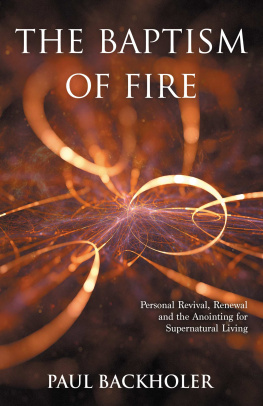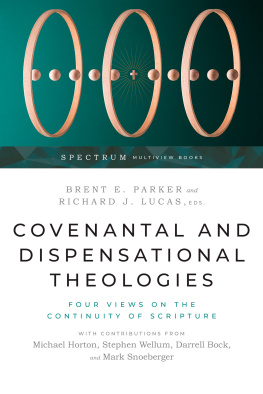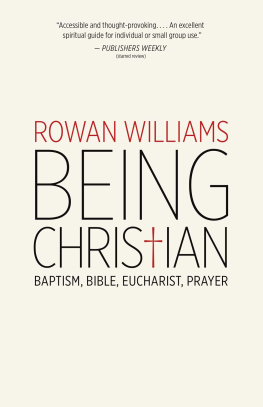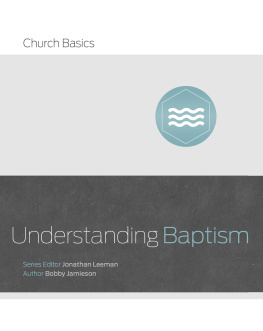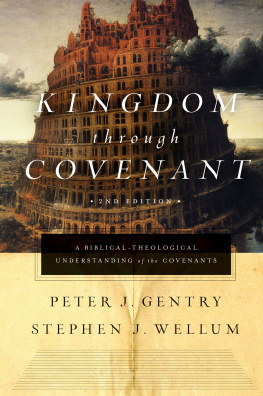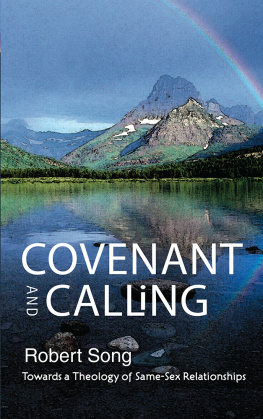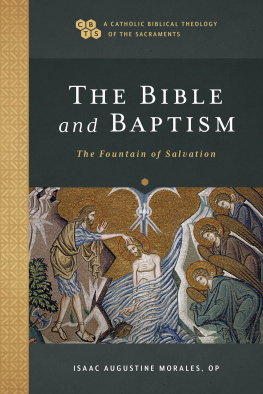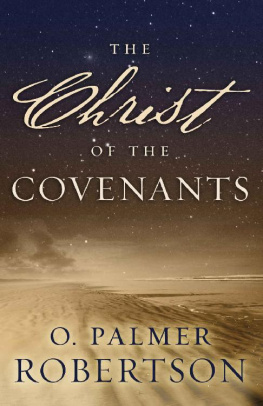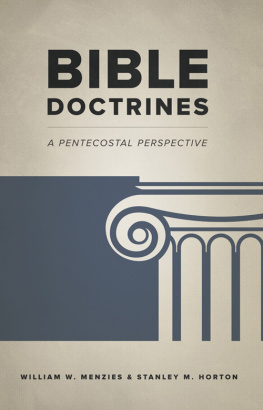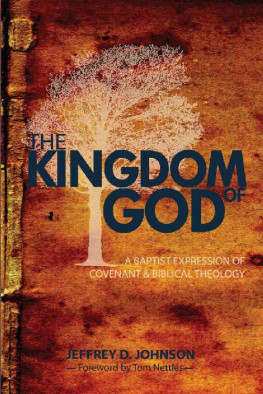Praise for The Distinctiveness of Baptist Covenant Theology
I remember my first acquaintance with Pascal Denault in 2002. He was in my Apologetics class at Facult de thologie vanglique in Montreal. He appeared to me as a very able young man but I had mixed feelings concerning his interest in Theology. Then, in 2004, he registered in my Homiletics class. I was amazed at the change that took place in him in such a short period of time. He was constantly interrupting me, asking all kinds of questions; obviously, his heart was entirely in the things of the Kingdom. In fact, through his constant intervention, he contributed to transform my Homiletics class into a Pastoral Theology class.
It is during that period that he approached me one night, asking me to be his mentor. It really caught me by surprise, but I joyfully accepted. It has been the beginning of a most blessed friendship, so much so, that I came to consider him as a son.
Then came this master of Theology project in which I acted as a study supervisor. When Pascal first came to me with his dissertation topic, I was not sure where he was heading. But as months went by, I became more and more enthusiastic with the specifics of the subject as well as with his treatment of it.
Needless to say that the subject could not have been more timely as Covenant Theology is gaining ground among Evangelical Protestantism. When I came to an understanding of Covenant Theology, about three decades ago, it appeared to me as the most coherent and consistent interpretative framework for Scripture. It is not a new concept for we can trace the idea of covenant from the Early Church. And it is an approach that occupied our forefathers at the time of Reformation. Its importance comes also from the fact that no doctrine exists in isolation with the others; all doctrines are in some way related. Thus, more specifically, Covenant Theology impacts our doctrines of the Church and of Baptism.
Historically, Puritans were holding to Covenant Theology though there were some differences in their understanding of the biblical covenants. And this is precisely at this point that Reformed Credobaptists and Paedobaptists disagree, whence their divergences on the doctrines of the Church and Baptism.
In order to grasp the subtleties of a doctrine, it is of great importance to look at its development, how the data of Scripture have been processed and where some shifts have taken place. This is the analysis that makes up the content of Pascals dissertation that is here presented in this book. One cannot but be impressed with the clarity of his compelling arguments, the careful and wise selection of his documentation and the irenic spirit in which he has written. As he brings us back to some of the seventeenth-century writings, we cannot help but ask ourselves how come these precious and sound works have fallen into oblivion.
Whether one agrees or disagrees with Pascals arguments and conclusion, nobody can read this book without admitting the seriousness and the soundness of the facts that are reported and that make it a most commendable book on the subject.
According to Pascals own words, one of his desires in writing this book was to breathe new life into the debates of seventeenth- century theologians. After reading it, we can certainly say: Mission accomplished.
Raymond Perron Ph.D
glise rforme baptiste de la Capitale
Quebec city, Qc
This book by Pascal Denault is a welcome addition to the literature on an issue that has vexed many for too long. It is clear that the seventeenth-century Particular Baptists formulation of covenant theology in the Second London Confession of Faith1677/89 (cf. 2 nd LCF 7.3, for example) was a modified version of the one contained in the Westminster Confession of Faith. But why the different formulation? Denaults work goes ad fontes (to the sources) to find the answer. And thats exactly why I am so thankful for his work. The primary, Particular Baptist sources are where we should start in seeking to understand the theology of our forebears. Denault shows from those sources not only that the Baptist formulation of covenant theology differed but why. It is too easy to note that it differed and then to impose our thought categories upon the Confession to answer the question of why. That is poor scholarship and bad historical-theological method. Denaults method is sound and a much-needed tonic in our day of rediscovering our roots. His findings are illuminating and will challenge many. He argues that the main difference had nothing to do with the covenant of works. The Particular Baptists were of one voice with their paedobaptist brethren on this issue. Neither did the main difference focus on the subjects of baptism, though it was a related issue. The main difference, according to Denault (and I think he is right), had to do with their view of covenant theology, concentrating on the definition of the covenant of grace and the differences between the old and new covenants in light of that definition.
Denault calls Nehemiah Coxe the most significant Baptist theologian [of the seventeenth century] when it comes to Covenant Theology. He is surely right. Coxe wrote a treatise on the covenants from Adam through Abraham and was, most likely, a co-editor of the 2 nd LCF. So any attempt to understand our Confession must start with Coxe and the context in which he wrote. This is what Denault does for us.
It is of interest to note that Coxe did not write on the differences between the old and new covenants due to the publication of John Owens exposition of Hebrews 8:6-13. The old Baptists agreed with much of Owens work (and the work of other paedobaptists on this issue). However, they differed with Owen and others on other points. Denaults work reveals to us what those other points were and how they argued from covenant theology to credobaptism.
I heartily commend this work to all Reformed Baptist pastors (and all others interested in covenant theology). Brothers, this is a must-read. As a Reformed Baptist pastor myself, I remember the first time I read seventeenth-century covenant theology from a Baptist perspective. It was both challenging and refreshing. It challenged me to rethink how covenant theology ought to be formulated and it refreshed me on two levels. First, it gave me a sound system of doctrine that reflected the teachings of Scripture from creation to consummation. Second, it helped me understand our Confession better. May this work do the same for many others!
Richard C. Barcellos, Ph.D.
Grace Reformed Baptist Church
Palmdale, CA
Pascal Denault deserves many thanks for his labor in researching and describing the nuances of English covenant theology in the Seventeenth Century. He has uncovered significant factors contributing to the differences between Presbyterian and Particular Baptist thought and practice, describing theological categories in easily accessible terms. He shows that in the formulations of covenant theology, the two groups had both similarities and significant divergences. For example, he shows that the facile popular notion that the Baptists scrupled over the concept of a Covenant of Works in their Confession is utterly false; in fact, they agreed in every way with their paedobaptist counterparts on this issue. But they differed on the nature of the revelation and administration of the Covenant of Grace. This drove their ecclesiology and their practice of credobaptism. This is an important work and deserves wide circulation.
James M. Renihan, Ph.D.
Dean, Professor of Historical Theology
Institute of Reformed Baptist Studies
It is with great pleasure that I recommend this Masters thesis of Pastor Pascal Denault. Pastor Denault has identified the primary difference between a Presbyterian covenant theology and a reformed baptist covenant theology which ultimately leads to their respective doctrine of the church and the sacraments. With many references to original sources in the 17 th Century, he shows that the Presbyterian concept of the Covenant of Grace relies upon a substance/administration hermeneutic which leads to the one covenant under two administrations (OT/NT) structure. This structure allows the Presbyterian to transfer the organic element of believers and their seed from the Abrahamic/Sinai Covenant administration into the New Covenant administration, thus allowing a mixed church of believers and unbelievers as well as infant baptism corresponding to circumcision. Further, he shows that the reformed baptist construction of the Covenant of Grace was established by a revealed/concluded (promise/fulfillment) structure, progressively revealed in the OT by the covenants of the promise and concluded in the NT by the institution of the New Covenant as the promise of the Covenant of Grace fulfilled. This is the primary difference between the covenant theologies of the Westminster Confession and the 1689 Second London Baptist Confession.


